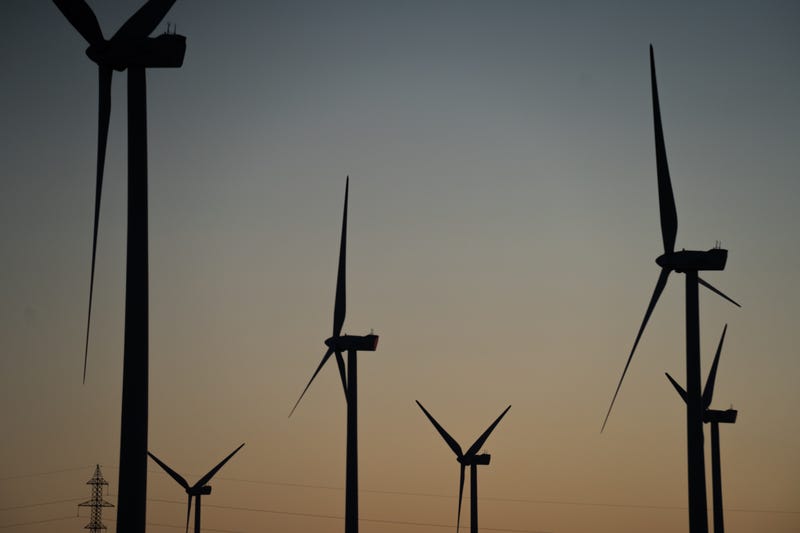
Hamburg, N.Y. (WBEN) - The fight is on to preserve the health of the Great Lakes, as Congressman Chris Jacobs announced on Thursday a piece of legislation set for the House of Representatives to block the construction and placement of wind turbines in the lakes.

Not only is Jacobs' legislation intended to block wind turbines from being placed in the Great Lakes, it also prohibits the granting of federal renewable credits to wind turbine projects that are located across the Great Lakes.
Several people in Western New York rely on Lake Erie and Lake Ontario for clean drinking water, and the construction and operation of the wind turbines could threaten that if something were to go wrong with a turbine out in the water.
In addition, Jacobs talked about how the environment and wildlife populations of fish and birds around the lakes will be affected by the addition of wind turbines. On top of that, recreation, tourism, sport and other industries that rely on the health of the Great Lakes will be impacted by the construction of wind turbines in the water.
"It's really, really nice to have Chris Jacobs stand up for us at a federal level," said longtime fishing guide Jim Hanley. "We've been known locally as the small, but vocal group from the Town of Evans that's been against turbines. There has been no economic impact studies, there has been nothing."
Hanley has been fishing on the waters of Lake Erie for more than 40 years, and has seen the good and the bad times with the lake during that span. He knows the risk of projects such wind turbines in the Great Lakes waters, and how it can send the environmental integrity of the lake into a tailspin again.
"All it is is they want to ram this through, they want to put these turbines in the lake," Hanley said. "You're going to put the turbines in there, floating or firm on the bottom, but they still have to jet plow. In other words, they dig probably a 10-foot trench from each one of those - and there's proposed 50 - all the way to shore. You're going to destroy spawning beds for fish, habitat on the bottom, plant life, everything. It's unconscionable what they're trying to do without any studies whatsoever, and that's the problem."
While there's fear that the ecosystem of the lake will take a huge toll with the construction of new wind turbines, Hanley foresees other potential issues and situations that can create havoc on the waters.
"Just before I got [to Hamburg], the lake was completely fogged in. You couldn't see 50 yards in front of you," he said after being out on the water. "What if they have [the wind turbines] out there and people don't have radar on their boat and smash into something like that? How are they going to service them in the winter when the ice is out there? How are they going to service them in a storm? What if they start leaking oil? The number of things that we question are just almost limitless."
In addition, a decision to build wind turbines in the lake could have life-altering implications for the livelihood of not just Hanley, but hundreds of others who make a living out on the waters of Lake Erie and the other Great Lakes going forward.
"That's unknown, and that's the problem," Hanley said. "Sport fishing on the Great Lakes is a $7 billion industry. That's a lot of money, and guys like me - going into my 44th year this year of guiding - that's how I feed my family. What if you put those out there and it destroys my best fishing areas? How do they know they're not going to just plow on through? Are they going to dive underwater?"
As the fight will surely rage on to prevent the construction of anymore wind turbines in or around Lake Erie and the Great Lakes, plenty of other areas more inland have seen a number of wind turbines sprout up throughout the community.
While Congressman Jacobs will fight for the blockage of wind turbines in the Great Lakes, he represents a lot of municipalities that have seen wind energy become more and more popular with wind turbines being constructed. While Jacobs is a proponent of local communities having the freedom to build more wind turbines at their discretion, he is not in favor of New York State's recent policy regarding the construction of these turbines as part of a larger project.
"What I don't like is several years ago, Gov. [Andrew] Cuomo passed a law changing regulation, which for major projects - which is actually counterintuitive, you would think a major project, major industrial wind project, major scale solar project - those projects now are pulled out from local control. They don't have a say in it. It goes to the state, NYSERDA [New York State Energy Research and Development Authority]," Jacobs explained. "The level of impact that they have on the environment, on the kind of feel and sense of a rural community, and that local people don't have control, I think, is the wrong way to go."
Despite the policy in place, many local communities have seen a large number of turbines go up, and have been able to reap in some benefits.
"For our town, it's been quite beneficial," said Town Supervisor of Eagle in Wyoming County, Mike Roche. "We have a host community agreement with the turbine company, or the wind power company, and consequently, we've been able to get enough money through the host agreement that our property owners don't pay any town tax."
While the towns that house these wind turbines are able to benefit through their agreements with the turbine companies, it has also allowed for residents of the town to be rewarded, as well.
"For certain residents, who have windmills on their property or are neighbors with windmills or have transmission lines going through, there's obviously some money coming there, too," said Town Supervisor of Arkwright in Chautauqua County, Brian McAvoy. "But it's hard to do it just for the money if you don't believe you're doing the right thing. Yeah, the money's nice, we use it wisely, it benefits the town, it benefits the residents, but you've got to believe you're doing the right thing."
"There is a financial benefit for the property owners. They negotiate contracts or have negotiated contracts in the past with the turbine companies, and so they receive a payment," Roche added. "I have no idea what any of those dollar values are."
For the most part, both Roche and McAvoy say that members of the community do not mind having the turbines around. Some residents understand the importance of making the switch to a greener future, especially since they can take advantage of the wind that blows in the generally open areas of the rural regions.
"I mean, if you don't believe that, it's hard to get your mind around the advantage of wind turbines," McAvoy said. "People want to say, 'Well, they're subsidized. Well, they're expensive. Well, they're this. Well, they're that' Yeah, sure. Any energy is, right? Building a nuclear plant is expensive, building a gas refinery is expensive. It's an investment that people have made to try to move us to a greener energy footprint."
However, there are some residents that have been outspoken about the wind turbines for one reason or another.
The most typical complaint both Town Supervisors get from their residents is relating to the noise the turbines make when operating.
"We have a lot of noise complaints, frankly, but not from all of them," McAvoy said. "We have certain placements of the windmills, certain wind direction, velocity and all that - which is all tracked to the nth degree - at certain times will cause noise issues. There's a handful of windmills that seem to be always well-represented on the complaint log, but most of them you don't hear anything about. They just run and they become part of the landscape for us."
Other complaints that have come in about the wind turbines include the unappealing look of them, interference it may cause with some technology such as televisions, and there are those who bring awareness to the environmental issues it can bring. This also includes the danger they bring to wildlife, more specifically wild birds.
However, Roche and McAvoy say their relationships with the energy companies, from a town perspective, are generally great. If there is an issue that is brought up with the company, they will do their best to respond and address any problems.
"I think out here, the companies have been very responsive to the concerns and the needs of people, and they seem to do a pretty decent job of responding to concerns when they received them" Roche explained. "Things seem to be working well."
"My tenure working with them, they've been very good," McAvoy added. "Very responsive, very professional. They're in it to make wind power, but I've had no issues at all working with them. I'd say it's a good relationship. You try to balance things out. For example, if they use one of our roads and do damage to it, which they really haven't since I've been here, they fix the roads. They take care of things. If they're moving an oversize load, or bringing in a crane or things like that, they're giving us a heads up that it's happening."
At the end of the day, both Arkwright and Eagle residents have made the decisions to have wind turbines constructed and operational in their backyards. While some may not see the benefits of wind energy becoming more prevalent in rural communities, many others are comfortable with the changing ways.
"I don't have a windmill, but I live next door to a windmill. Honestly, and I don't just say this, it doesn't bother me. They become part of the landscape," McAvoy said. "The way they're placed, they're not too closely placed in Arkwright, so there's some separation. I don't think it's different. It changed the landscape, I'll give you that, but I don't think they did it in an overbearing way. I mean, people like to say it's industrialized. I don't know. Arkwright still feels pretty rural to me, but it was a big change."

